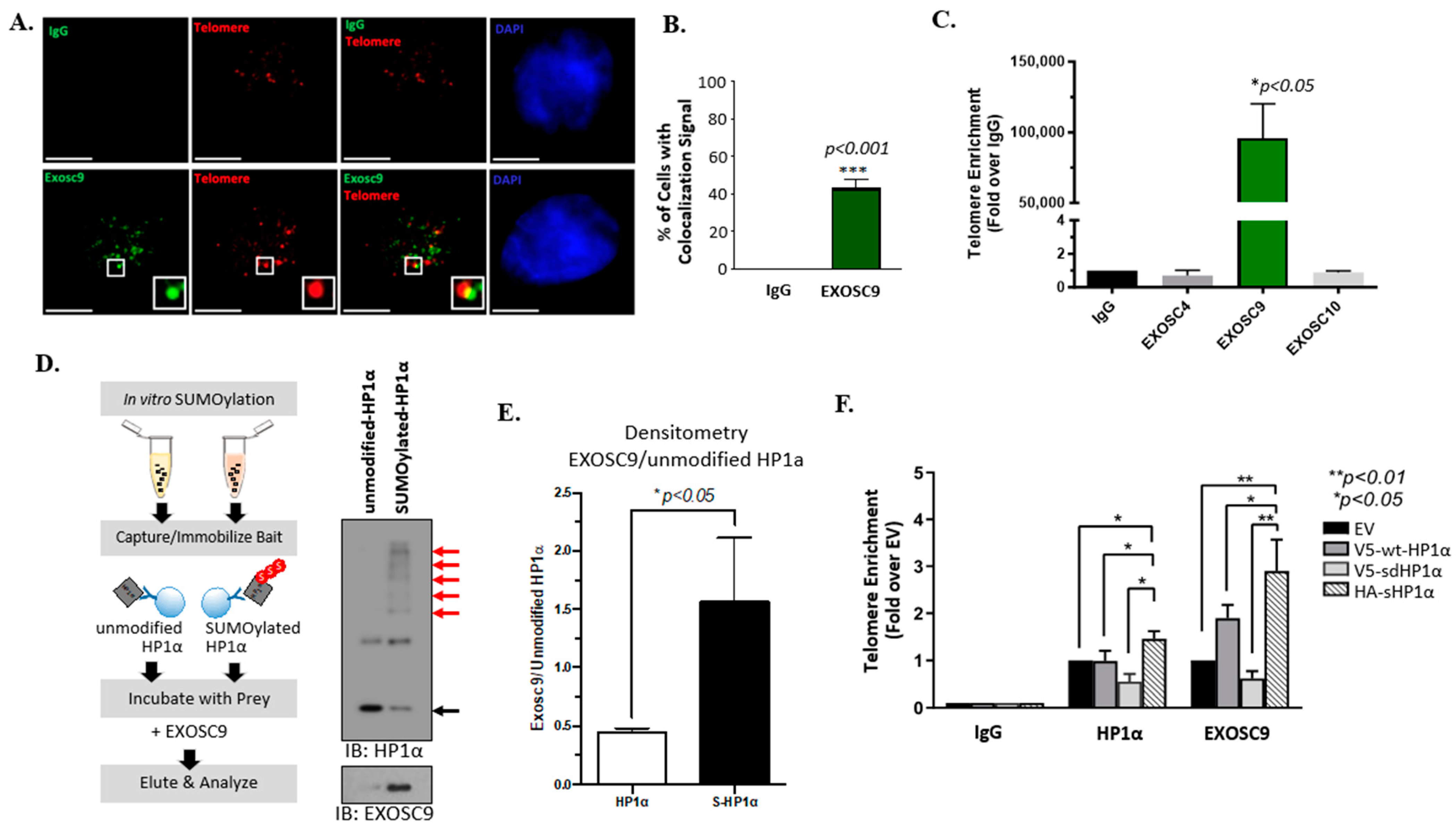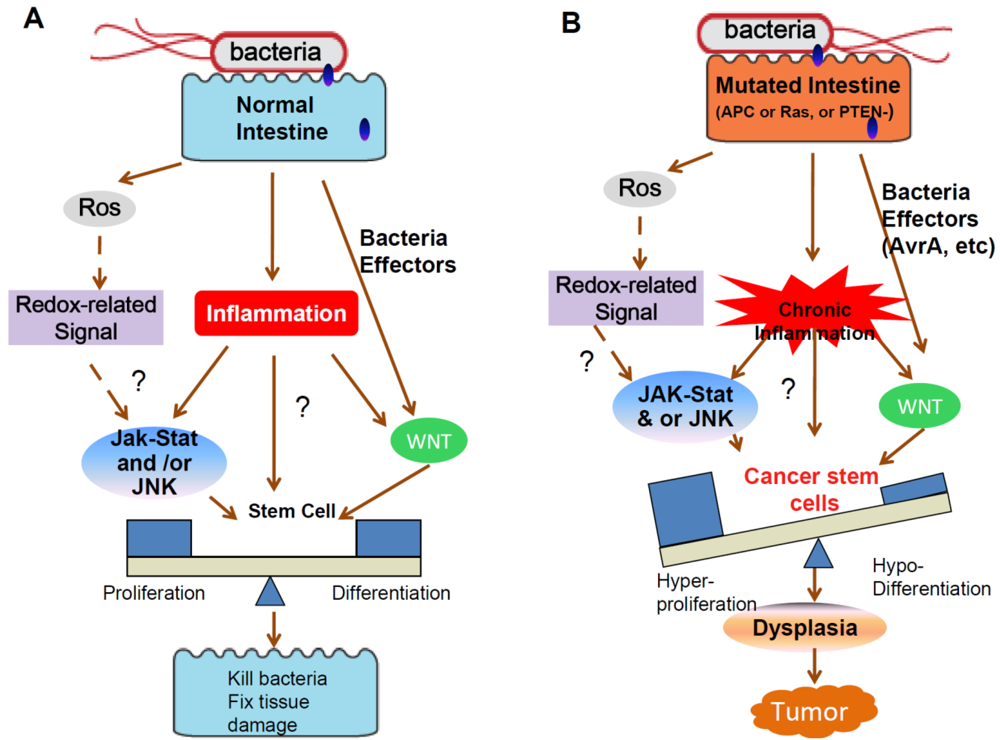Cells, Free Full-Text
Por um escritor misterioso
Last updated 27 dezembro 2024

Long, noncoding RNAs (lncRNAs) are indispensable for normal cell physiology and, consequently, are tightly regulated in human cells. Yet, unlike mRNA, substantially less is known about the mechanisms for lncRNA degradation. It is important to delineate the regulatory control of lncRNA degradation, particularly for lncRNA telomeric repeat-containing RNA (TERRA), as the TERRA-telomere R-loops dictate cell cycle progression and genomic stability. We now report that the exosome complex component Exosc9 degrades lncRNA TERRA in human mammary epithelial cells. Heterochromatin protein 1 alpha (HP1α) recruits Exosc9 to the telomeres; specifically, the SUMO-modified form of HP1α supports interaction with Exosc9 and, as previously reported, lncRNA TERRA. The telomeric enrichment of Exosc9 is cell cycle-dependent and consistent with the loss of telomeric TERRA in the S/G2 phase. Elevated Exosc9 is frequently observed and drives the growth of endocrine therapy-resistant (ET-R) HR+ breast cancer (BCa) cells. Specifically, the knockdown of Exosc9 inversely impacts telomeric R-loops and the integrity of the chromosome ends of ET-R cells. Consistently, Exosc9 levels dictate DNA damage and the sensitivity of ET-R BCa cells to PARP inhibitors. In this regard, Exosc9 may serve as a promising biomarker for predicting the response to PARP inhibitors as a targeted monotherapy for ET-R HR+ BCa.

Remote immune processes revealed by immune-derived circulating

Cells, Free Full-Text

MitoQuicLy: A high-throughput method for quantifying cell-free DNA

STEM CELLS: Vol 35, No 5

Cancers, Free Full-Text
Recomendado para você
-
 Agachamento Sumô: como fazer, músculos e dicas fundamentais27 dezembro 2024
Agachamento Sumô: como fazer, músculos e dicas fundamentais27 dezembro 2024 -
 Como fazer o Levantamento Terra e o Terra Sumô27 dezembro 2024
Como fazer o Levantamento Terra e o Terra Sumô27 dezembro 2024 -
 A Diferença Entre Terra Sumô e Agachamento Sumô27 dezembro 2024
A Diferença Entre Terra Sumô e Agachamento Sumô27 dezembro 2024 -
 Agachamento: tipos, como fazer e benefícios27 dezembro 2024
Agachamento: tipos, como fazer e benefícios27 dezembro 2024 -
 LEVANTAMENTO TERRA SUMO Consultoria online Treinador Kaká27 dezembro 2024
LEVANTAMENTO TERRA SUMO Consultoria online Treinador Kaká27 dezembro 2024 -
 Barra Haxagonal - Compre Online Diretamente da Fábrica27 dezembro 2024
Barra Haxagonal - Compre Online Diretamente da Fábrica27 dezembro 2024 -
 Agachamento Terra - Como fazer correto, músculos, benefícios e dicas - MundoBoaForma27 dezembro 2024
Agachamento Terra - Como fazer correto, músculos, benefícios e dicas - MundoBoaForma27 dezembro 2024 -
terra sumo para que serve|Pesquisa do TikTok27 dezembro 2024
-
 Levantamento terra ou peso morto (deadlift): As 10 melhores variações - MYPROTEIN™27 dezembro 2024
Levantamento terra ou peso morto (deadlift): As 10 melhores variações - MYPROTEIN™27 dezembro 2024 -
 9 fatos que farão você incluir o Levantamento Terra no seu treino!27 dezembro 2024
9 fatos que farão você incluir o Levantamento Terra no seu treino!27 dezembro 2024
você pode gostar
-
 STL file Realistic Dinosaurs T-Rex Tyrannosaurus 🦖・3D printable27 dezembro 2024
STL file Realistic Dinosaurs T-Rex Tyrannosaurus 🦖・3D printable27 dezembro 2024 -
 CapCut_Yuujirou Hanma In Baki The Grappler27 dezembro 2024
CapCut_Yuujirou Hanma In Baki The Grappler27 dezembro 2024 -
 Top 25 Best Must Play PSP Games of All Time27 dezembro 2024
Top 25 Best Must Play PSP Games of All Time27 dezembro 2024 -
 Adrian GARDA, Professor (Full), PhD in Zoology27 dezembro 2024
Adrian GARDA, Professor (Full), PhD in Zoology27 dezembro 2024 -
 FNF: The Blueballs Incident - Play Online on Snokido27 dezembro 2024
FNF: The Blueballs Incident - Play Online on Snokido27 dezembro 2024 -
 Tommy Bahama Veracruz Cay Horizon Isles Short Sleeve Woven Camp Shirt27 dezembro 2024
Tommy Bahama Veracruz Cay Horizon Isles Short Sleeve Woven Camp Shirt27 dezembro 2024 -
 IS Infinite Stratos 2 Infinite Wedding Folder Icon by27 dezembro 2024
IS Infinite Stratos 2 Infinite Wedding Folder Icon by27 dezembro 2024 -
 Menina Dos Desenhos Animados Roupas De Outono Garotas Japonesas Jogo De Roupas Meninas Japonesas PNG , Roupa De Outono Romântica Com, Materiais, Roupa Imagem PNG e PSD Para Download Gratuito27 dezembro 2024
Menina Dos Desenhos Animados Roupas De Outono Garotas Japonesas Jogo De Roupas Meninas Japonesas PNG , Roupa De Outono Romântica Com, Materiais, Roupa Imagem PNG e PSD Para Download Gratuito27 dezembro 2024 -
North Quincy High team competes in regional pingpong tournaments27 dezembro 2024
-
 Shazam! Fury of the Gods, ONE MINUTE REVIEW, DC27 dezembro 2024
Shazam! Fury of the Gods, ONE MINUTE REVIEW, DC27 dezembro 2024
